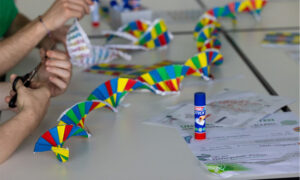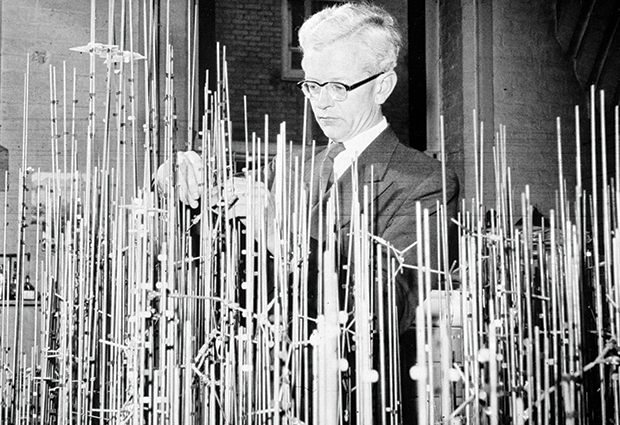
Read the latest Issue
'I believe that international activity is very important in building world peace'

This year marks 100 years since the birth of Sir John Kendrew (24 March 1917–23 August 1997), Nobel Laureate and EMBL’s first Director-General. In this interview from the EMBL Archives, Kendrew reflects on his time leading ‘the Lab’.
Sir John: The first big meeting was rather a happy accident. Alonso Liquori had invited a lot of people to Ravello, Italy for a summer course. And they happened to be interested in the Lab. At first, all the talk was about the lab, but then Conrad Waddington, the British geneticist, injected the idea of also having courses, meetings and research grants. Politically, that turned out to be much easier than the Lab. The meeting resulted, of course, in the founding of EMBO, which was successful right from the start and helped morale. In fact, at the beginning we thought EMBO and the lab would be the same.
Sir John: The internationalism of CERN was, of course, a major influence, We felt creating the right atmosphere and building a critical mass of biologists in a wide range of fields could best be done at a European level. CERN, of course, had a big machine. You couldn’t do that nationally. That was a big political advantage. The trouble with biology was that there was no big machine. It was only in the late ’60s that large machines came into play with molecular biology – the synchotron facility, for example. By then we argued for at least 50 per cent instrumentation. But we always wanted to incorporate some instrumentation at the EMBL. Of course, the UK Laboratory of Molecular Biology was a major influence – after all, I had worked there for many years and one of the advantages we had at Cambridge, for example, was that at first we were in the physics department with lots of big shops. In the early days of protein crystallography, almost all of the equipment was made in the laboratory.
Personally, I believe that international activity is very important in building world peace. And science has always been the most developed international activity that there is. It is as simple as that.
Sir John: We were very strong in instrumentation, so things like EM (electron microscopy) at Heidelberg and crystallography at Grenoble and Hamburg were going to do well. Incidentally, the Hamburg outstation was really a bit of personal generosity on the part of Ken Holmes and Gerd Rosenbaum. This was also the time when molecular cell biology was getting off the ground, a rather obvious area. One very important article was by Ari Helenius and Kai Simons on how viruses get into cells. The paper was turned down at first – the editor said it wasn’t “interesting” (he laughs), but it turned out to be one of the most interesting papers in the field.
Sir John: A lot of senior people played with the idea, but for one reason or other didn’t come. It was easier to get young people because they didn’t have such entrenched positions. We looked for excellence and promise. We took a strong position with our Council that we were not going to have national quotas. We had our Council in all the countries, and good friends in America, like Paul Doty and Jim Watson.
Sir John: Well, it was the most interesting 20 years of my life. You see, starting something from zero presents a rather unusual opportunity. You have so much freedom to be creative. Personally, I believe that international activity is very important in building world peace. And science has always been the most developed international activity that there is. It is as simple as that.
This interview, by David States, was first published in EMBL 20 Years On: 1974–1994, a report issued to celebrate the Laboratory’s 20th anniversary.
Looking for past print editions of EMBLetc.? Browse our archive, going back 20 years.
EMBLetc. archive